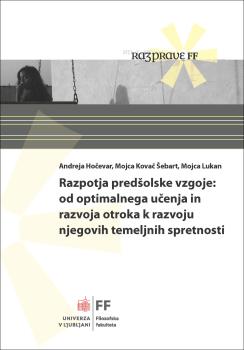Razpotja predšolske vzgoje: od optimalnega učenja in razvoja otroka k razvoju njegovih temeljnih spretnosti
Keywords:
early childhood education, preschool education, public preschools, Slovenia, Serbia, international institutionsSynopsis
The monograph explores two key dimensions of quality design in public preschool institutions (hereinafter referred to as preschools) in Slovenia. The first chapter examines the process quality of preschools, with a particular focus on how educational practices implemented by preschool educators align—or fail to align—with legal frameworks and curriculum guidelines. Specifically, it addresses the extent to which public preschools uphold an objective, critical, and pluralistic educational process that safeguards children against indoctrination, while also respecting parents' rights to ensure that education and teaching are in conformity with their own religious and philosophical convictions. The issue is illustrated through an example of handling a family in preschools. The second chapter addresses the expectations of international institutions (OECD, World Bank, EU institutions) that are associated with understanding the aims and objectives of quality preschool education. These institutions see it as an investment in human capital, as something that pays off financially over time and contributes to greater flexibility and responsiveness of individuals to the demands of the labour market. The policies in EU Member States and other countries around the world are implementing the expectations of these international institutions, changing the traditional concept of quality preschool education, which is focused on the comprehensive learning and development of children and their progress in various areas of learning and development.
Downloads

Downloads
Published
Series
License

This work is licensed under a Creative Commons Attribution-ShareAlike 4.0 International License.

